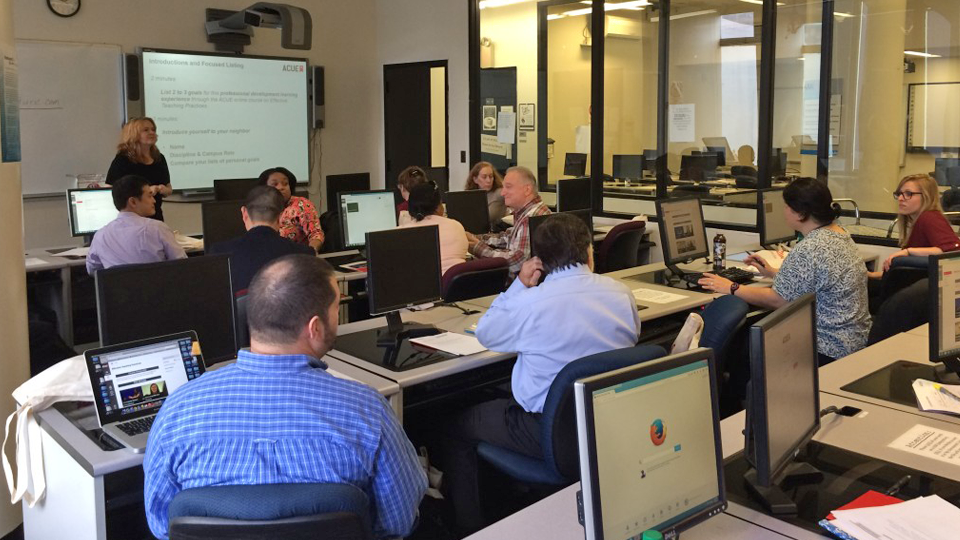
LIU Launches ACUE’s Course on Effective Teaching Practices
 Last week, Long Island University’s Post and Brooklyn campuses became the latest partner to launch ACUE’s pilot course on Effective Teaching Practices. Continue…
Last week, Long Island University’s Post and Brooklyn campuses became the latest partner to launch ACUE’s pilot course on Effective Teaching Practices. Continue…

 Last week, Long Island University’s Post and Brooklyn campuses became the latest partner to launch ACUE’s pilot course on Effective Teaching Practices. Continue…
Last week, Long Island University’s Post and Brooklyn campuses became the latest partner to launch ACUE’s pilot course on Effective Teaching Practices. Continue…
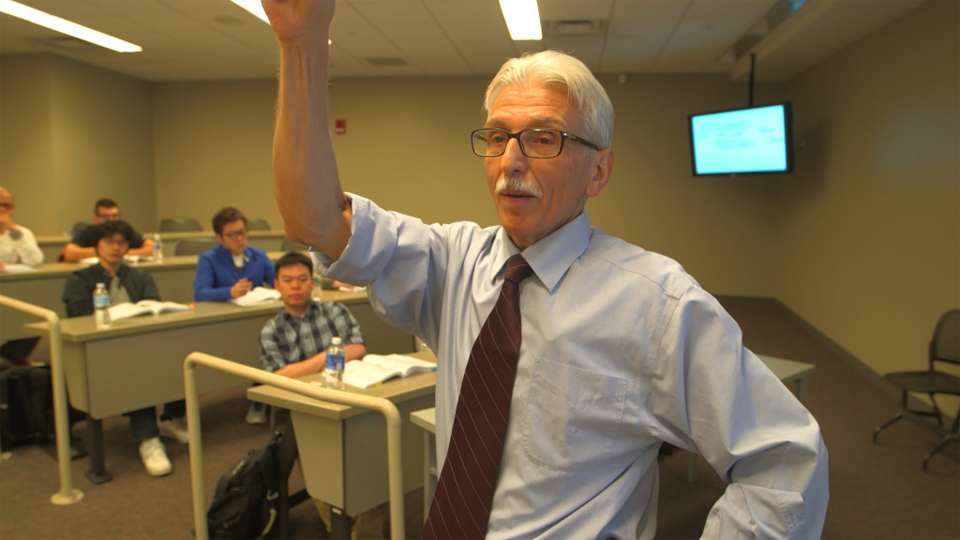
Faculty development is the most important topic in the teaching and learning community, according to an annual survey produced by the Educause Learning Initiative (ELI). Continue…
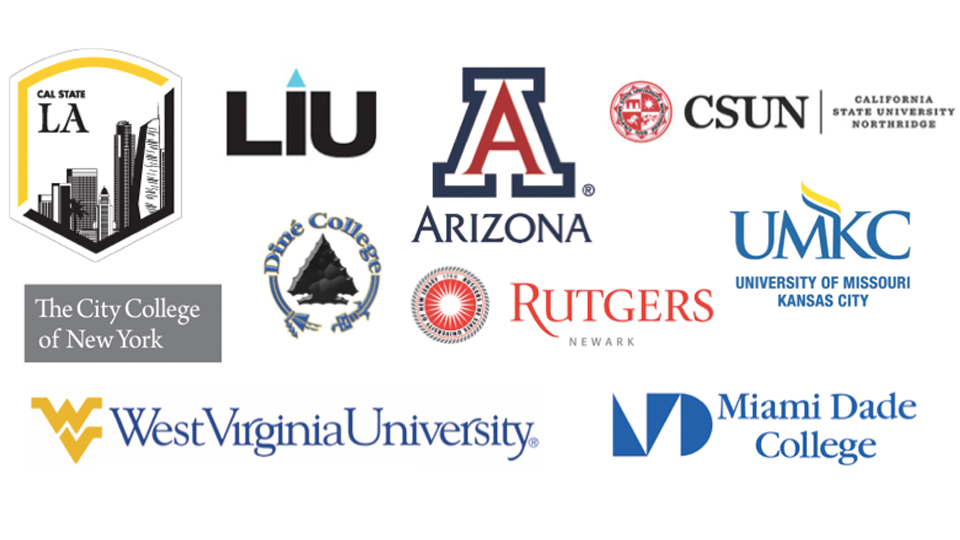
What do Matadors, Kangaroos, and Mountaineers have in common? Continue…
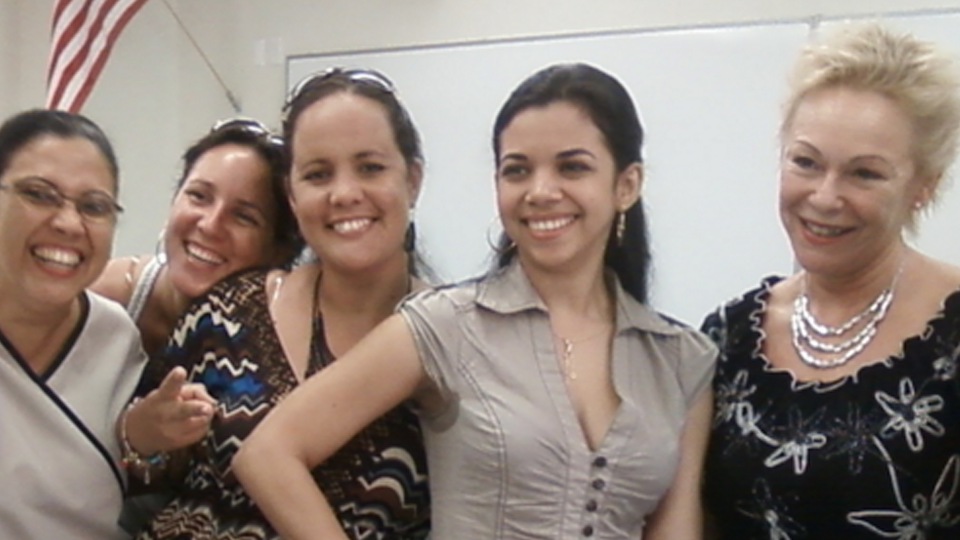
In Lourdes Albo-Beyda’s class, understanding her grammar and writing lessons is about more than a letter grade. It’s about a better future for her students. Continue…
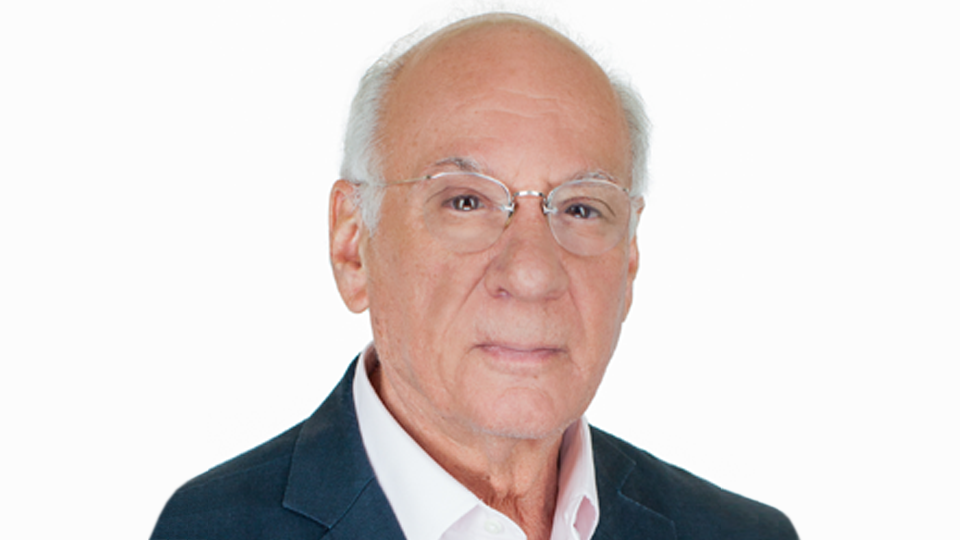
 I can clearly remember my first day of college teaching.
I can clearly remember my first day of college teaching.
Researchers are taking a closer look at the expanding roles that full-time, non-tenure-track faculty members play in higher education.
These kinds of educators are becoming increasingly relied upon by the colleges and universities that employ them, Peter Schmidt reports in the Chronicle of Higher Education. Schmidt sat down with one of the researchers who has interviewed dozens of these people to take their pulse at a time when dramatic changes are underway in the academic labor workforce.
A full version of the interview with Baylor University’s Nathan F. Alleman can be found on the Chronicle’s web site. We pulled out a few of the tidbits we found most interesting:
“They tend to be thought of as people who come in and teach a class and they leave. What we have seen is that many of them were heavily involved in a lot of the aspects of the faculty life that we tend to think about the tenure-track faculty as doing. They are involved in service, they are undergraduate-program directors, they are running summer outreach programs. This is important because when we think about the range of activities related to collegiality — sort of willingness to engage with departmental colleagues, willingness to serve, self-giving for the good of the department — we don’t usually think that that is the sort of thing that non-tenure-track faculty do.
“People in the performing arts, they saw a lot of one another, they worked together on projects, they socialized inside and outside the institution. Others were more isolated naturally, such as in some of the sciences and mathematics, and it really depended on the initiative of the tenured faculty. Often there was clumping around job status. People said, ‘Well, we go for lunch, but it is always the tenure-track people, they sit together, and the non-tenure-track people, we kind of have our own thing.’
Collegiality is a thing that allows a group of autonomous professionals to find some common way to work together. It is the grease in the wheels. When we see this shrinking pool of tenure-track faculty, and growing pool of non-tenure-track faculty who are not part of this collegial system fully, what we see is a shrinking group of people who are responsible for a lot of governance, a lot of decision making. I think, ultimately, denying full collegiality to non-tenure-track faculty is bad for the institution and is bad for the tenure-track faculty themselves.
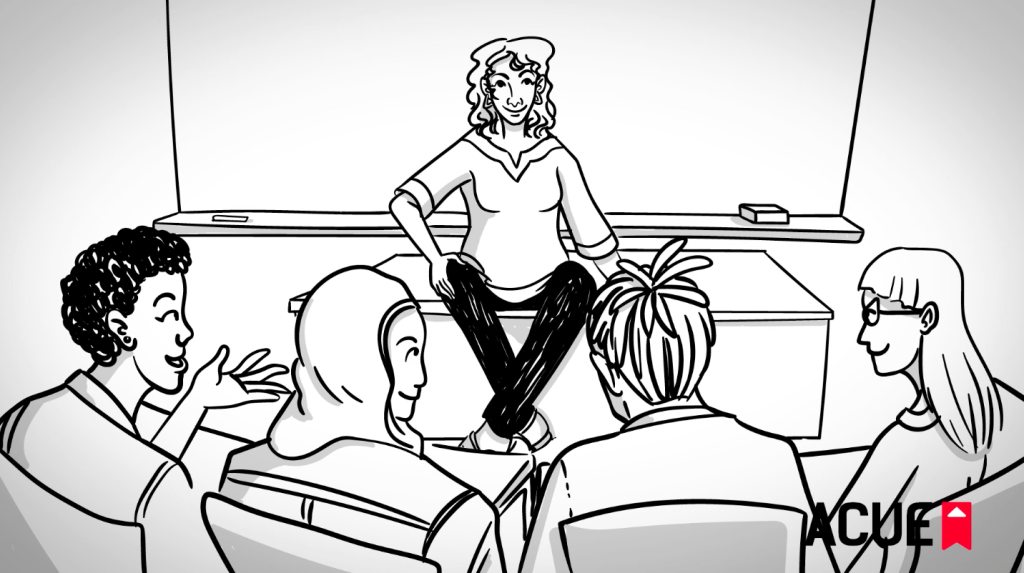
“I used to do a great deal of guerilla teaching,” says Gina Foster, the director of the Teaching and Learning Commons at Lehman College in New York.
Foster would arrive the day a class would begin, uncertain of what to expect from her students and the course she was teaching. Despite the challenges, these experiences taught Foster how to manage different situations and diverse groups of students. Continue…
Three columns
Two columns, no links
There are many techniques that college educators should know about as part of their instructional practices. But for Joseph Abbondandolo, if he isn’t able to connect with his students, he says the rest of his teaching won’t matter.
“It’s all about the relationships,” said Abbondandolo. “I tell my students that I don’t remmebr a whole lot about what my college experience since graduating more than 30 years ago. What I remember vividly is my relationships with my professors.”
But it’s not just about his personal experience for Abbondandolo. One of the more inspiring moments of his experience with ACUE’s Course in Effective Teaching Practices was hearing from an expert that there is research to support connecting with studnets. In fact, Abbondandolo admits he became emotional the first time he heard Jose Bowen’s introductory remarks for XX module.
“I was like, here is a real subject matter expert saying that it’s all about relationships,” said Abbondandolo.
Abbondandolo has been teaching as an adjunct instructor at CCNY since 2011. This semester, he taught a Saturday seminar class to undergraduates called Strategic Management. The challenges were immense. There were 54 students in the class and almost all of them had full-time or part-time jobs that they were working while pursuing their degrees. Several had children of their own.
One thing that Abbondandolo often struggled with was getting his studnets to retain information from one week to the next.
“Since classes are held once a week, it can be very challenging for students to recall what we did during the prior week’s class. Early on in the semester when I would start each class by asking them about the last class, no one responded. The silence was deafening!” Abbondandolo says.
That began to change, Abbondandolo says, when he started having his students fill out a “One Minute Paper” before leaving each week. “It required them to think about what they had just learned, reflect on what was confusing, then write it down for me to college.” Abbondandolo would review the short reflection papers on his subway ride home and be prepared to start the next week’s class with the data to facilitate a discussion around what students understood, what they wanted to talk about more, and what might have confused them. In one case, several students wanted to continue talking about workplace diversity and inclusivity and what it means for organizations to truly embrace those values. They wanted to talk about it further.
Given how much he cares about connecting with students, Abbondandolo received special recogniztion from his students this semester. To show their appreciation for Abbondandolo’s commitment to connections, the Humans of CCNY Facebook page posted a message from students to Abbondandolo as the spring semester came to a close:
“We appreciate your efforts in making this class not only very informative but truly enjoyable. We all felt welcome to participate and noticed growth in ourselves throughout our presentation skills & peer interactions. We appreciate your kindness and openness to students. Thank you for allowing us to belong. Thank you for being an awesome Human. We love you!”
The modules that most resonated with me were from the establishing a productive learning environment unit of study. I make sure that there are opportunities to do some small talk and I often stay after class and really try to learn about who they are as people outside of the classroom. Keeping them engaged throughout a 2.5
Intro and Background
My start to teaching was trial-by-fire. The position I was hired for opened up just a couple of weeks before the semester started. I had my predecessor’s syllabus and lesson material, but I had to do a lot of experimenting.
Why I joined ACUE
I’m always looking to develop skills and improve, which is why I jumped at the opportunity to participate in this. I realized that while I may have been doing some of the techniques that were in the course, I didn’t have the grounding or the foundation on how to apply them effectively.
ACUE Module:
Since classes are held once a week, it can be very challenging for students to recall what we did during the prior week’s class. Early on in the semester when I would start each class by asking them about the last class, no one responded. The silence was deafening!
When I started having students complete a “One-Minute Paper” at the end of the class, it required them to think about what they had just learned, reflect on what was confusing, then write it down for me to college. This way, I am able to review it on my subway ride home and can come into class the next week equipped to facilitate a discussion around what students understood, what they wanted to talk about more, and what might have confused them. One example is when we covered the issue of diversity and culture in organization, and what it means for organizations to truly embrace these values. Based on what they wrote after that class, I learned that they wanted to talk about it further.
The modules that most resonated with me were from the establishing a productive learning environment unit of study. I make sure that there are opportunities to do some small talk and I often stay after class and really try to learn about who they are as people outside of the classroom. Keeping them engaged throughout a 2.5 hour or 3-hour course is really hard to do. What’s been helpful is the active learning techniques I’ve learned for large-class modules. I’m still trying to take a concept and break it down.
One of the things I mentioned in my first couple classes is my whole college experience. I related to the class that after 30 years of graduating, so I’m an old guy. I mentioned that I don’t remember a whole lot from then. What I do remember vividly is my relationships with my professors. I remember watching the the video, I teared up. Josh Bowen. It’s all about the relationships. The course has sort of helped me with framework. That whole relationship is what it’s about for me. I’m connected to all these. Going through the course, i was like, here is a real phd saying that it’s all about relationships.
a lot of the students were saying you’re not like the other professors. it’s not rocket science, but i would try to get them involved in soliciting their feedback, putting them into small groups. I really was coming at it not so much from telling them how to do things but getting them involved in how it is. they appreciated those different ways of style.
when looking at recruiting, I had students in small groups of three say what a good interview looks like. Record it. What’s an example of a bad interview?
Personally. I’m always looking to develop my skills and improve. I was doing a lot of these things , but I dont have the grounding or the structure on how to do things. As a result i’m doing some of these things even better now.
1-minute manager: first time I did it this year, it worked great. i was so ecstatic. I read their feedback about what worked, what didn’t understand. I used to do a reflection at the start of a saturday course but no one could remember what we did the week prior. This way they’re writing down certain aspects of class, they hand it in, and then we go over some of the things covered the previous class. We talk about things they didn’t understand.
We were talking about culture and diversity and the paradox in that a lot of organizations say they are open and diverse to differences of opinion and thought and doing things in different ways. yet, they’re really not because the culture tends to week out those who are different. That was something people wanted to talk more about and delve further into.
Based on what they wrote, we talked about it further, what it meant to individuals and the entire organization.
I think we’re about halfway done. 2 c,d,e,f; 3,b,c,d,e; 4a,c…
54 students in my class. we’re there every Saturday. I think that one that resonated with me is establishing a productive learning environment. We do some small talk and I stay after class. Really try to learn about them and help them. Keeping them engaged throughout a 2.5 hour or 3-hour course is really hard to do. What’s been helpful is the active learning techniques I’ve learned for large-class modules. I’m still trying to take a concept and break it down. challenges have been…I still had 1/3 of class who just didn’t communicate at least to the larger group. could be cultural but I need to work at that.
Some of the students just weren’t prepared and I wanted to see how I could help them individually. When they’re not understanding. 90% of these students work full-time and it’s one of the reasons they’re taking a class on the weekend. Some work over night. It’s challenges like that you have be avail.
Some of the students…10 of 54 have kids…not only do they work but they have other needs to attend to. so it’s really fascinating.
One of the things I mentioned in my first couple classes is my whole college experience. I related to the class that after 30 years of graduating, so I’m an old guy. I mentioned that I don’t remember a whole lot from then. What I do remember vividly is my relationships with my professors. I remember watching the the video, I teared up. Josh Bowen. It’s all about the relationships. The course has sort of helped me with framework. That whole relationship is what it’s about for me. I’m connected to all these. Going through the course, i was like, here is a real phd saying that it’s all about relationships.
muslim faith…one of the classroom said ouch. We started talking about it. To the person who brought it up had a lot of facts. Now especially.
We do debates.
We teach change in culture. We’re teaching. We’re facilitating. in one of the video clips. With Saundra McGuire. used to be teaching students about the cent. Its not about that. it’s about action learning and facilitating learning so that students can appreciate what you’re trying to convey to them.
https://www.facebook.com/HumansOfCCNY/posts/1359378207483067:0